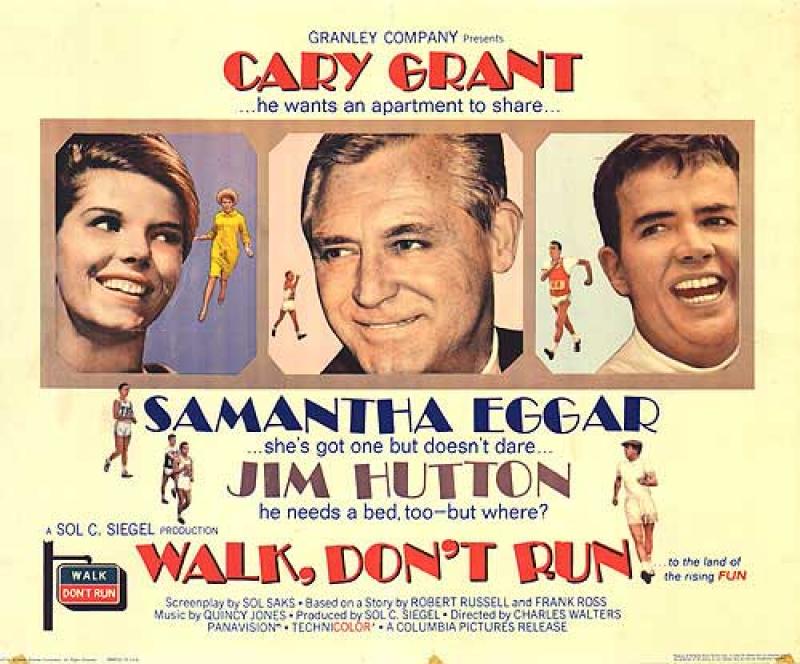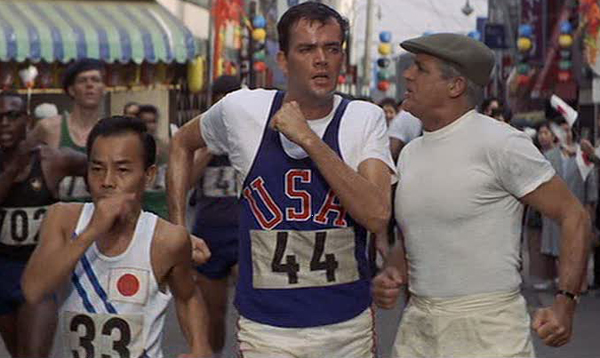theartsdesk Olympics: Walk, Don't Run | reviews, news & interviews
theartsdesk Olympics: Walk, Don't Run
theartsdesk Olympics: Walk, Don't Run
Olympic racewalking forms the backdrop to Cary Grant's last film

Though this 1966 comedy was a light and fluffy thing, it was gazed upon benignly by the critics, mostly because it was a late vehicle for the well-oiled Cary Grant charm machine. It proved to be his last film, in fact. Others viewed it equally fondly because it contained scenes of Grant in his boxer shorts, a challenge he tackled with panache despite his 62 years.
The flick's Olympic connection is central, though ludicrous. British industrialist Sir William Rutland (Grant) makes a business trip to Tokyo, but arrives two days early. The city is hosting the 1964 Olympics and all available accommodation has been snapped up by the visiting throngs. Dedicated cinéastes will instantly detect the similarities to 1943's The More the Merrier, which concerned a housing shortage in wartime Washington DC. Sir William visits the British Embassy looking for assistance, and happens to spot an ad for a temporary apartment-share. It has been placed by prim and fastidious Englishwoman Christine Easton (Samantha Eggar), who had intended to find herself a female flatmate, but succumbs to Rutland's pushy persuasiveness.
 The piece is nudged from romcom to farce when Rutland decides that, despite Ms Easton's protestations, he'll share his portion of her space with a visiting American, Steve Davis (Jim Hutton), a member of the American Olympic racewalking team. Grant was evidently considered too senior to play Eggar's love interest, so he's cast as matchmaker to herself and Hutton, a role he relishes after being irked by Eggar's fiancé, a drab diplomat played by John Standing (Hutton, Grant and Japanese competitor, pictured above). It's all quite silly, but director Charles Walters shot it during the real-life Tokyo Olympics, and copious location scenes of both the city and various Olympic events (not least the intrinsically preposterous race-walking) lend colour to the proceedings. Music buffs will also relish the jazzy soundtrack by the great Quincy Jones, who was brought into the project at Grant's urging.
The piece is nudged from romcom to farce when Rutland decides that, despite Ms Easton's protestations, he'll share his portion of her space with a visiting American, Steve Davis (Jim Hutton), a member of the American Olympic racewalking team. Grant was evidently considered too senior to play Eggar's love interest, so he's cast as matchmaker to herself and Hutton, a role he relishes after being irked by Eggar's fiancé, a drab diplomat played by John Standing (Hutton, Grant and Japanese competitor, pictured above). It's all quite silly, but director Charles Walters shot it during the real-life Tokyo Olympics, and copious location scenes of both the city and various Olympic events (not least the intrinsically preposterous race-walking) lend colour to the proceedings. Music buffs will also relish the jazzy soundtrack by the great Quincy Jones, who was brought into the project at Grant's urging.
Explore topics
Share this article
Add comment
The future of Arts Journalism
You can stop theartsdesk.com closing!
We urgently need financing to survive. Our fundraising drive has thus far raised £33,000 but we need to reach £100,000 or we will be forced to close. Please contribute here: https://gofund.me/c3f6033d
And if you can forward this information to anyone who might assist, we’d be grateful.

Subscribe to theartsdesk.com
Thank you for continuing to read our work on theartsdesk.com. For unlimited access to every article in its entirety, including our archive of more than 15,000 pieces, we're asking for £5 per month or £40 per year. We feel it's a very good deal, and hope you do too.
To take a subscription now simply click here.
And if you're looking for that extra gift for a friend or family member, why not treat them to a theartsdesk.com gift subscription?
more Film
 Magic Farm review - numpties from the Nineties
A comedy about youth TV putting trends above truth
Magic Farm review - numpties from the Nineties
A comedy about youth TV putting trends above truth
 Good One review - a life lesson in the wild with her dad and his pal
A wise-beyond-her-years teen discovers male limitations in a deft indie drama
Good One review - a life lesson in the wild with her dad and his pal
A wise-beyond-her-years teen discovers male limitations in a deft indie drama
 E.1027 - Eileen Gray and the House by the Sea review - dull docu-fiction take on the designer-architect
Iconic Irish modernist Eileen Gray gets an artsy and overly reverential appraisal
E.1027 - Eileen Gray and the House by the Sea review - dull docu-fiction take on the designer-architect
Iconic Irish modernist Eileen Gray gets an artsy and overly reverential appraisal
 The Marching Band review - what's the French for 'Brassed Off'?
Brothers suddenly united in blood kinship – and music
The Marching Band review - what's the French for 'Brassed Off'?
Brothers suddenly united in blood kinship – and music
 The Last Musician of Auschwitz review - a haunting testament
When fine music was played in a death factory
The Last Musician of Auschwitz review - a haunting testament
When fine music was played in a death factory
 DVD/Blu-ray: Slade in Flame
One of the great rock movies gets a 50th anniversary revival
DVD/Blu-ray: Slade in Flame
One of the great rock movies gets a 50th anniversary revival
 Riefenstahl review - fascinating fascism? Portrait of the Nazis' favourite film-maker
A new documentary unlocks the archive of the woman who directed 'Triumph of the Will'
Riefenstahl review - fascinating fascism? Portrait of the Nazis' favourite film-maker
A new documentary unlocks the archive of the woman who directed 'Triumph of the Will'
 The Surfer review - Nicolas Cage is relentlessly down and out in western Australia
Irish director Lorcan Finnegan's manic take on macho surfer culture
The Surfer review - Nicolas Cage is relentlessly down and out in western Australia
Irish director Lorcan Finnegan's manic take on macho surfer culture
 Desire: The Carl Craig Story review - a worthy, brand-conscious encomium for a techno star
Documentary on the Detroit electronic music producer borders on hagiographic
Desire: The Carl Craig Story review - a worthy, brand-conscious encomium for a techno star
Documentary on the Detroit electronic music producer borders on hagiographic
 Words of War review - portrait of a doomed truth-seeker in Putin's Russia
Maxine Peake gives a poignant performance as the fearless reporter Anna Politkovskaya
Words of War review - portrait of a doomed truth-seeker in Putin's Russia
Maxine Peake gives a poignant performance as the fearless reporter Anna Politkovskaya
 theartsdesk Q&A: Gary Oldman on playing John Cheever in 'Parthenope' and beating the booze
Exclusive: A candid interview with the master actor
theartsdesk Q&A: Gary Oldman on playing John Cheever in 'Parthenope' and beating the booze
Exclusive: A candid interview with the master actor
 Blu-ray: Laurel & Hardy - The Silent Years (1928)
Ten more early shorts, handsomely restored and annotated
Blu-ray: Laurel & Hardy - The Silent Years (1928)
Ten more early shorts, handsomely restored and annotated

Comments
Brilliant piece